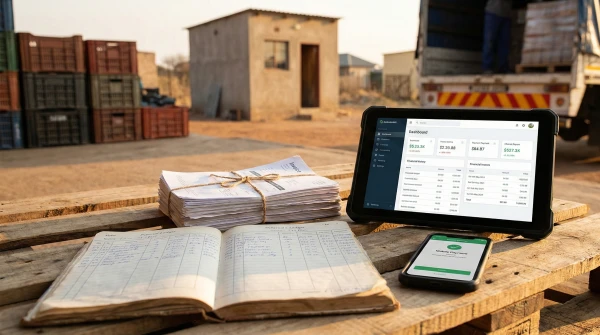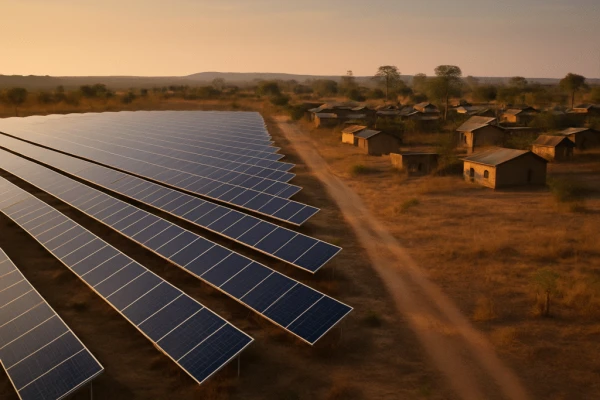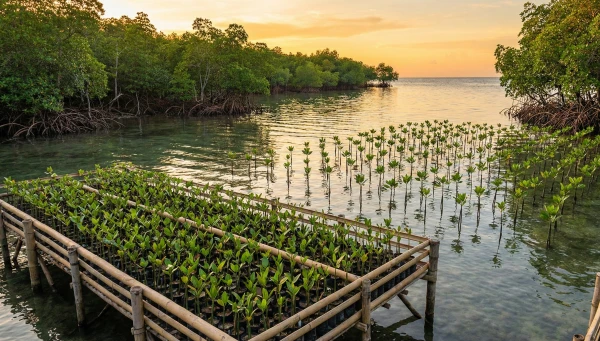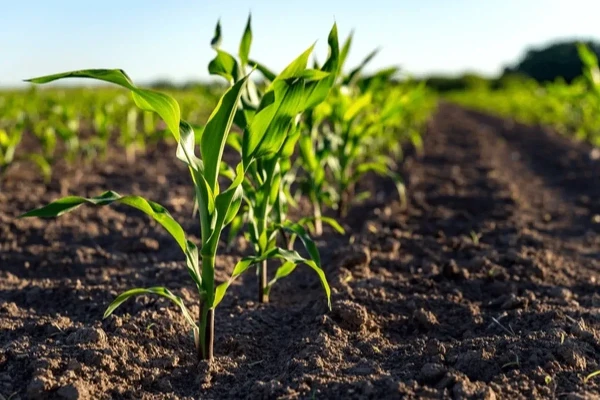Our Views
Agribusiness solutions for investors in emerging markets
Investing in agribusiness within emerging markets presents both significant opportunities and unique challenges. To navigate this landscape effectively, investors require comprehensive solutions that encompass every facet of agricultural project development and management. Aninver Development Partners, in collaboration with Tepro, offers a joint venture that provides end-to-end services tailored for large-scale farming and agribusiness investments. This partnership ensures that projects are not only financially viable but also sustainably managed, inclusive, and aligned with local development goals.
1.Comprehensive Service Offering
A successful agribusiness venture requires much more than just funding – it demands end-to-end capabilities that cover every aspect of developing and running agricultural projects. The joint venture between Aninver and Tepro is uniquely positioned as a one-stop solution provider for large-scale farming and agribusiness investments. This article details the JV’s comprehensive range of services, from on-ground farm management and technical advisory to rehabilitation programs, smallholder farmer integration, climate-smart agriculture, and capacity building. With this full spectrum offering, the JV not only invests in projects but also ensures they are expertly managed, inclusive, and sustainable, thereby appealing to investors and governments alike in emerging markets.
End-to-End Agribusiness Solutions
The Aninver-Tepro JV operates on a full-service model. Rather than a narrow focus on finance, it delivers all the critical services needed to make agribusiness projects successful:
- Project Identification & Feasibility: The JV starts by identifying promising agribusiness opportunities – whether it's an existing plantation ripe for turnaround, greenfield farm development on fertile land, or a value-chain project like a processing facility. The team conducts thorough feasibility studies, leveraging Aninver’s expertise in market research and project viability analysis. They assess factors such as soil quality, water availability, market demand, logistics, and financial projections. Aninver’s track record includes feasibility studies for large-scale agricultural processing in Africa (e.g. cashew processing in Zambia), showcasing its ability to deliver in-depth analysis for investment decisions. By front-loading rigorous feasibility and due diligence, the JV ensures only sound projects move forward to the investment and implementation stage.

- Investment Structuring & Advisory: Once a project is deemed viable, the JV provides investment advisory services to structure the deal. This involves determining the optimal financing mix (equity, debt, mezzanine), securing co-investors or lenders, and advising on legal setup (concessions, land leases, corporate structuring). With decades of combined experience, the JV guides sponsors (whether governments or private owners) on how to make the project investor-ready – for example, improving governance structures or meeting international compliance standards. Tepro’s consulting arm accompanies clients through the investment process “from the identification of the opportunity and project dimensioning to technical design”. The JV can prepare investment memos, business plans and even facilitate negotiations between stakeholders. This advisory role is crucial for packaging projects attractively to institutional investors and ensuring all parties are aligned on the venture’s roadmap.
- Capital Raising & Blended Finance: A key service is raising capital for projects. The JV taps into Aninver’s global network of DFIs, funds, and impact investors to bring financing to the table. It might lead the creation of a syndicate or apply for blended finance programs (for instance, securing a grant component from a development program to augment a project’s funding). The JV’s team understands the criteria of various funding sources – whether a climate fund looking for sustainable agriculture projects or a DFI seeking impact on smallholder incomes – and structures proposals accordingly. By doing so, the JV often unlocks concessional funding that can be combined with private investment. This service is exemplified by comparable initiatives in the market: for example, IDB Invest partnered with a specialized lender (LAAD) to boost food security financing for agribusiness SMEs in Latin America. In a similar vein, the JV’s capital raising efforts ensure that agribusiness projects in emerging markets get the right mix of capital for success, at competitive terms.
- Turnkey Project Implementation: Unlike typical investment firms, the JV doesn’t stop at financing – it actively oversees project implementation from inception. Once a project is funded and launched, the JV can take charge of procuring equipment, hiring personnel, establishing farm infrastructure, and rolling out operational plans. This turnkey approach is particularly valuable in emerging markets where project execution can be challenging. The JV essentially serves as the developer/operator in the initial phase, de-risking construction and setup for investors. For example, if the project is a new 2,000-hectare horticulture farm in East Africa, the JV’s experts will handle land clearing, installation of irrigation systems, procurement of seedlings, and recruitment of farm managers and workers. Thanks to Tepro’s decades of agricultural project management, the JV has the know-how to execute such complex undertakings efficiently. This ensures that the project transitions smoothly from planning to actual operations, adhering to timelines and budgets.
2. Professional Farm Management Services
At the heart of the JV’s offering is professional farm management – the day-to-day running and optimization of agricultural operations. This service is a cornerstone because even the best-funded project can falter without skilled management:
- Experienced Farm Operators: Tepro brings an unmatched pedigree in farm management, with nearly 50 years in the field and current management of ~80,000 hectares of farms across Europe. The JV deploys this expertise to the project sites, installing experienced farm managers, agronomists, and technical specialists. They implement best-in-class agricultural practices covering crop planning, soil management, mechanization, pest control, and harvest/post-harvest handling. Large-scale farms managed by Tepro have achieved high efficiencies and yields thanks to such professional oversight. For the investor or owner, having the JV manage the farm means access to top-tier operational talent that few individual projects could hire on their own.

- Operational Planning and Execution: The JV team prepares detailed annual operating plans for each farm or agribusiness facility. This includes cropping schedules, input use plans (seeds, fertilizers, etc.), irrigation calendars, labor plans, and equipment maintenance schedules. They also set KPIs (key performance indicators) such as target yields per hectare, cost per ton produced, etc. The management team conducts regular monitoring and adjusts operations in real time to address issues like weather variability or pest outbreaks. This corporate-style management ensures that the farm is run like a well-oiled enterprise. It’s a stark contrast to the often suboptimal management seen in many emerging market farms that may lack structure or modern techniques. By maximizing productivity and efficiency, the JV’s farm management service directly protects and enhances investor returns.
- Technology and Innovation in Farming: Another aspect of the farm management service is the infusion of agritech and innovation into operations. The JV leverages modern tools such as remote sensing (drones, satellite imagery for crop health monitoring), precision agriculture (GPS-guided tractors, IoT soil sensors), and farm management software for data-driven decision-making. Tepro has been at the forefront of integrating technology – for instance, it partnered in the AgrarIA project to use artificial intelligence for optimizing irrigation in almond farming, significantly cutting water usage. The JV can replicate such innovations in its projects, implementing climate-smart and efficient techniques. This not only improves productivity but also builds resilience to climate risks. As climate change poses challenges (droughts, erratic rainfall), these tech-enabled practices are crucial for sustaining yields. Investors benefit because farms that adopt climate-smart agriculture tend to have more stable outputs and are often viewed favorably by offtakers and insurers (potentially lowering insurance premiums or commanding better contract terms).

- Maintenance of Assets: Large agribusiness projects involve significant assets – tractors, combine harvesters, irrigation systems, processing mills, storage warehouses, etc. The JV’s farm management includes a strong focus on asset maintenance and uptime. They implement preventive maintenance schedules and have protocols for quick repairs, often maintaining an inventory of critical spare parts on-site. This reduces downtime during critical periods (e.g. harvest), avoiding losses. By prolonging the life of equipment and infrastructure, the JV protects the capital investments made into the project. For example, ensuring a rice mill’s regular maintenance can keep it running optimally for years beyond its standard life, directly affecting the project’s profitability.
- In summary, the professional farm management service means that when the JV invests in or takes on a project, it doesn’t rely on third parties to run it – it runs the project itself with seasoned professionals, much like a specialized operator. This all-in-one approach is highly reassuring to investors who might be concerned about operational risks.
3. Rehabilitation and Turnaround Programs
A significant portion of agribusiness opportunities in emerging markets involves brownfield projects – existing farms or agribusiness operations that are underperforming or abandoned, but have high potential. The JV specializes in designing and executing rehabilitation programs to turn around such assets:
- Assessing Underperformance: The process begins with a comprehensive assessment of why a farm or facility is underperforming. Common issues include outdated equipment, poor management, soil degradation, insufficient working capital, or broken linkages to markets. The JV’s experts conduct technical and financial audits. For instance, they might discover that a 1,000 ha government farm has low yields due to salinized soils and broken irrigation pumps. Or a processing factory might be running at 30% capacity due to unreliable raw material supply. By pinpointing the constraints, the JV formulates a rehabilitation plan targeting those issues.
- Rehabilitation Plan: A typical turnaround plan could involve replanting or soil restoration, overhauling machinery, retraining staff, introducing new crop varieties, and improving agronomic practices. It often requires fresh capital injection for upgrades and a new management approach. The JV leverages its multi-disciplinary team here – engineers to fix infrastructure, agronomists to improve farming methods, and financial managers to restructure budgets. For example, in one of Tepro’s consultancy assignments, it provided technical management assessment for a new 4,000 ha rice farm in the Senegal River Valley, guiding the project sponsors on necessary improvements to achieve viability. In a rehabilitation scenario, such expertise is applied hands-on: the JV might take a failing rice farm and, within a couple of seasons, bring it to full production by leveling fields, repairing canals, and introducing better cultivation techniques.

- Incremental Phasing: The JV often employs a phased approach to rehabilitation. Phase 1 might focus on quick wins – e.g. get 50% of the land productive with minimal investment by repairing key assets – to start generating cash flow. Phase 2 then scales up improvements across the rest of the operation. This staged strategy reduces risk and capital outlay upfront. It also allows learning and adapting the plan as the turnaround progresses. Throughout, the JV sets milestones (such as achieving target yield by year X, or reaching certain capacity utilization in a factory) and closely monitors progress.
- Success Metrics: The ultimate goal of rehabilitation is to significantly improve the asset’s performance and value. Metrics of success include yield improvement (e.g. maize yields rising from 2 tons/ha to 6 tons/ha after interventions), cost reduction per unit output, increased utilization of processing facilities, and return to profitability. The JV also looks at impact metrics – such as jobs preserved/created or smallholders linked (if previously a defunct operation wasn’t benefiting the community, turning it around often means new employment and offtake opportunities for local farmers). By highlighting these improvements, the JV can sometimes negotiate support from governments or grants (since reviving an agribusiness has socio-economic benefits).
- One real-world style example: Suppose the JV takes over an estate in Latin America that used to be a productive fruit plantation but had fallen into neglect. The rehabilitation program invests in new drip irrigation, rehabilitates 1000 hectares of orchards with climate-resilient fruit tree varieties, and sets up a training program for workers on modern pruning and harvesting. Within 3 years, the estate’s output is doubled and it secures export contracts, turning a previously loss-making farm into a profitable exporter. This illustrates how the JV’s comprehensive turnaround capabilities can unlock value and returns from distressed agribusiness assets.
4. Smallholder Integration and Outgrower Schemes
Inclusive growth is a hallmark of the JV’s approach. Agribusiness investments are most sustainable and impactful when they integrate smallholder farmers and local communities into the value chain. The JV offers services to design and implement outgrower schemes and smallholder programs alongside its large-scale projects:
- Outgrower Scheme Design: For a large plantation or processing facility, the JV can create an outgrower program where surrounding small farmers are contracted to supply produce. The JV sets up the structure – selecting smallholders, providing them with inputs (seeds, fertilizers) on credit, and guaranteeing purchase of their harvest at fair prices. This arrangement benefits the project by securing additional supply and expanding production without the need to acquire all the land. For smallholders, it provides access to markets, technology, and stable income. The JV’s expertise in emerging markets agriculture ensures these schemes are culturally and economically tailored. An example from Tepro’s experience: a feasibility study in Nigeria for a large-scale rice processing facility included an out-growers scheme to involve local farmers. Building on such insights, the JV can actualize outgrower networks that might number in the hundreds or thousands of farmers.
- Capacity Building for Smallholders: Simply signing up smallholders is not enough; they need support to meet quality and volume requirements. The JV provides ongoing training and extension services to enrolled farmers. This can involve deploying agronomists to villages to teach best practices in crop cultivation, pest management, and post-harvest handling. It may include demonstration plots to showcase improved techniques or seed varieties. Additionally, the JV can facilitate microfinance or input loans to ensure farmers have what they need for a good crop. This capacity building focus draws from Aninver’s strong background in training and community-level projects – for example, Aninver has led capacity building programs for agriculture in Liberia and supported women’s groups in agricultural value chains in Mauritania. Such experience in grassroots engagement is invaluable for making smallholder integration successful. As a result, participating farmers see yield improvements and higher incomes, while the JV’s project gains a reliable supply base.
- Inclusive Governance: The JV also emphasizes governance structures that give smallholders a voice. This might include forming farmer cooperatives or committees that liaise with the plantation management. In some cases, smallholders can even be offered an equity stake or profit-sharing in the larger venture, aligning everyone’s incentives. By fostering a sense of partnership, the JV ensures long-term commitment from the community, which can prevent conflicts and encourage sustainable land use.
- Monitoring and Impact Evaluation: As part of its service, the JV will monitor the progress of smallholder integration programs. This involves tracking how many farmers are involved, their production levels, and the impact on their livelihoods. Such data is often important for reporting to impact investors or DFIs who funded the project. The JV’s ability to conduct impact evaluations (a skillset in Aninver’s consulting toolkit) means it can credibly measure and report outcomes like increased farmer income or improved food security in the area. This transparency builds trust and also helps refine the program over time.
Ultimately, the JV’s smallholder integration service ensures that large-scale agribusiness investments uplift local farmers rather than sideline them. For investors focused on ESG and impact, this is a compelling aspect: the JV-managed projects create broad-based benefits, reducing poverty and inequality while also securing the raw material supply and community goodwill necessary for long-term success.
5. Climate-Smart Agriculture and Sustainability
In today’s world, agriculture must adapt to climate change and minimize environmental impacts. The JV embeds climate-smart agriculture practices and sustainability principles in every project, offering services that make agribusiness ventures resilient and future-proof:
- Climate Risk Assessment: Early in project development, the JV conducts climate risk assessments – analyzing how temperature rise, changing rainfall patterns, or extreme weather might affect the farm’s output. They utilize climate data and scenarios to inform crop choices and infrastructure design. For example, if a region is projected to face more droughts, the JV might prioritize drought-tolerant crop varieties or invest in water-efficient irrigation. These assessments ensure that projects are designed with resilience in mind, safeguarding investor interests against climate volatility.

- Sustainable Land Management: The JV’s farm management incorporates practices such as conservation agriculture (minimal tillage to preserve soil structure), crop rotation and diversification to maintain soil health, and agroforestry (integrating trees into farms to improve carbon sequestration and shade). By maintaining soil fertility and preventing erosion, these practices help sustain yields long-term. They also often qualify projects for certifications or carbon credits. For instance, a plantation that practices agroforestry and reduces chemical use might gain organic or Rainforest Alliance certification, potentially fetching premium prices for produce. The JV guides projects to achieve such sustainability certifications, adding value for investors and meeting the growing market demand for sustainably produced goods.
- Water Management: Water scarcity is a critical issue in many target regions (e.g. parts of Africa). The JV emphasizes efficient water management – deploying drip irrigation, constructing water harvesting structures (like small reservoirs or catchment basins), and scheduling irrigation based on scientific needs rather than fixed calendars. The aforementioned AgrarIA project example, where Tepro and partners used AI to optimize irrigation with up to 58% water savings, is the kind of innovation the JV applies. Additionally, the JV can implement solar-powered irrigation pumps to reduce reliance on diesel and cut costs and emissions. Managing water wisely not only is eco-friendly but also reduces operating costs and protects the project against drought risk.
- Renewable Energy and Waste Utilization: Many agribusiness projects can integrate renewable energy – for example, installing solar panels on a farm to power processing equipment or using agricultural waste (biomass) to generate energy. The JV provides technical know-how to set up these systems. If running a sugar mill, for instance, the JV could implement a biomass boiler to convert cane residues into electricity, both powering operations and potentially selling excess power (an approach aligned with projects financed by groups like EAIF in West Africa’s biomass energy sector). Similarly, waste like animal manure can be turned into biogas or organic fertilizer. By turning waste into value and using clean energy, the JV improves the environmental footprint and can create additional revenue streams (energy sales, carbon credits). These enhancements also make projects more attractive to green investors and climate finance facilities.

- Compliance and Reporting: The JV ensures that all operations comply with local and international environmental standards. Regular audits are carried out for things like agrochemical use, biodiversity impact, and greenhouse gas emissions. The JV’s sustainability officers prepare ESG reports for investors, detailing the project’s performance on climate and social metrics. This transparency not only fulfills reporting obligations for impact-focused investors but can also highlight positives such as emission reductions or community development achievements.
Through its climate-smart agriculture services, the JV effectively future-proofs projects. It tackles the dual challenge of increasing productivity while reducing environmental impact – a balance that is crucial for long-term viability in agribusiness. Investors partnering with the JV can be confident that their projects will meet high sustainability criteria and contribute to global climate and development goals.
6. Capacity Building and Skills Development
Human capacity is a vital component of sustained success in agribusiness. Recognizing this, the JV offers extensive capacity building services for individuals and institutions involved in its projects:
- Workforce Training: Large farm projects often create hundreds of local jobs, from farm laborers to technicians and administrative staff. The JV institutes training programs to upskill the local workforce. This can range from basic agricultural techniques for laborers (e.g. safe pesticide application, efficient harvesting methods) to more advanced technical training for supervisors (e.g. farm management software usage, machinery operation and maintenance). These trainings improve productivity and safety on the farm. Aninver has broad experience in training programs – for example, delivering COVID-19 resilience training for community agriculture in Jamaica. Building on such methodologies, the JV tailors on-site training curriculums, often in collaboration with local agricultural extension services or vocational institutes. As a result, employees become more competent and the project benefits from higher efficiency and lower error rates.
- Management and Entrepreneurship Training: For projects that involve local partners or for empowering smallholder cooperatives, the JV provides training in business management, finance, and entrepreneurship. This might include workshops on bookkeeping for cooperative leaders, or agribusiness entrepreneurship courses for budding local agripreneurs who could become supply chain partners. By strengthening these skills, the JV helps local entities eventually take on greater roles. For instance, a local manager could be groomed to take over the plantation’s operations after a few years of JV oversight, ensuring continuity and local ownership. This approach was seen in some JV projects like training local greenhouse workers in Nigeria to eventually manage operations. Empowering people in this way builds good will and a legacy of knowledge transfer.
- Institutional Capacity Building: Beyond individuals, the JV also works on strengthening institutional capacities – such as local farmer cooperatives, water user associations, or even government agencies partnering on the project. This could involve advising a Ministry of Agriculture unit on how to oversee outgrower schemes, or helping a cooperative set up transparent governance and accounting systems. By doing so, the broader ecosystem around the project is reinforced, which is critical for long-term sustainability once the JV eventually exits the investment.
- Knowledge Sharing Platforms: The JV often establishes knowledge-sharing mechanisms, like field days where successful farmers share practices with peers, or online platforms where data and insights from the project are disseminated. In one scenario, if the JV operates multiple farm sites in a country, it might facilitate exchange visits between them so teams can learn from each other. This culture of continuous learning ensures that best practices spread and any mistakes are not repeated across projects.
- Monitoring Training Impact: Just as with other aspects, the JV will monitor the outcomes of its capacity building. It tracks metrics like number of people trained, improvement in skills (which can be assessed via tests or productivity changes), and retention of trained staff. High retention rates of skilled workers, for instance, indicate the project is developing a loyal, capable team – a positive sign for investors concerned about operational stability.
By investing in people, the JV ensures that the projects are not just financially and technically sound, but also socially rooted and self-sufficient in human capital over time. This comprehensive capacity building is especially appealing to development-oriented investors and governments, as it clearly contributes to local empowerment and economic development beyond the immediate project.
7. Comprehensive Services in Action: An Integrated Approach
To see how these services come together, consider a holistic example: The JV undertakes a project to develop a large agro-industrial hub in East Africa – comprising a 3,000 ha irrigated farm, a processing factory (for example, a cassava starch plant), and a network of 1,500 outgrower farmers.
- During planning, the JV’s feasibility and advisory teams map out the entire value chain, ensure viability of both farm and factory (checking market demand for starch, logistics to port, etc.), and structure the investment (maybe a combination of equity fund investment and a DFI loan for the factory construction).
- At implementation, the JV acts as project manager: clearing the land, building irrigation and the factory, and hiring initial staff. It kicks off rehabilitation on some adjacent unused land to bring extra hectares under cultivation.
- Farm management experts put in place a crop schedule for cassava on the estate, and also guide the outgrowers on staggered planting to have year-round supply to the factory. They deploy tractors and high-quality planting materials on the core farm, while extension officers supply improved cassava cuttings and training to the outgrowers (smallholder integration).
- Smallholder services ensure each outgrower gets fertilizer and knows modern techniques, drastically improving their yields. The JV signs purchase agreements with each farmer, guaranteeing a market for their harvest.
- Climate-smart practices are integrated: the farm uses drip irrigation fed by a solar-powered pump, reducing carbon footprint and ensuring reliable water. Parts of the farm are intercropped with nitrogen-fixing cover crops to maintain soil health. The factory runs on a biomass boiler fueled by waste cassava pulp, generating electricity for the facility and even powering workers’ housing.
- Capacity building runs in parallel: local technicians are trained to operate the starch processing machinery, farm workers are taught efficient harvesting and the importance of quality (to reduce contamination of the starch), and cooperative leaders from the outgrowers are trained in governance and basic accounting to manage the input loans and contracts.
- As the project proceeds, the JV monitors progress: yields, factory output, farmer incomes, environmental parameters. It provides investors with regular reports showing the farm hitting its targets and the factory nearing profitability, as well as positive impact metrics (e.g. 1,500 smallholders’ incomes doubled, X tons of CO₂ emissions avoided via clean energy).
This integrated hub illustrates the full suite of services the JV offers – every link from farm to market is handled with expertise. The outcome is a thriving agribusiness that produces export-quality starch, generates solid returns, and has transformed the local agricultural landscape by uplifting small farmers and using sustainable practices.
8. Conclusion: A Partner for 360° Agribusiness Development
The Aninver-Tepro JV distinguishes itself by providing a comprehensive set of agribusiness services under one roof. From the nascent idea of a project to the delivery of products to market, the JV is there every step of the way: identifying opportunities, structuring investments, managing daily operations, integrating communities, implementing climate-smart innovations, and building local capacity. This 360° approach ensures that agribusiness projects are not only financed, but are also effectively executed and maintained for the long term.
For institutional investors, DFIs, or governments, engaging with this JV means mitigating many of the typical risks associated with agribusiness in emerging markets – as the JV’s experts proactively address technical, operational, and social challenges. It means having a competent operator so that capital translates into real results on the ground. And it means achieving development outcomes (jobs, food security, sustainability) alongside financial returns.
Call to Action: If you are a stakeholder looking to develop or invest in a large-scale agribusiness project in Sub-Saharan Africa, Southeast Asia, or Latin America, consider partnering with our JV. With our comprehensive service offering, we take projects from concept to reality and beyond, ensuring profitability and impact. Reach out to us to learn how our farm management, advisory, and integrated solutions can turn your agribusiness ambitions into a sustainable success story. Together, we can cultivate prosperity and resilience in the world’s most promising agricultural frontiers. You can email us at: aninver@aninver.com










